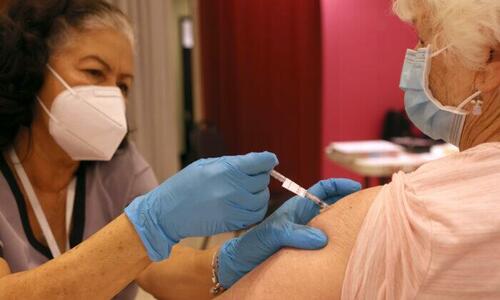
Authored by Zachary Stieber via The Epoch Times (emphasis ours),
The effectiveness of Moderna’s COVID-19 vaccine against infection turns negative over time, according to a new study that was funded by the vaccine maker.

The effectiveness of three doses—a primary series and a booster—against infection remained above 50 percent after 150 days against BA.1, a subvariant of the Omicron virus variant, researchers estimated.
But against more recent strains, including the currently-dominant BA.5, the effectiveness turned negative.
Against BA.2, BA.4, and BA.5, the effectiveness went negative after 150 days.
Against BA.1.12.1, the effectiveness turned negative after 91 days.
Negative effectiveness means a vaccinated person is more likely to contract COVID-19, the disease the virus causes, than an unvaccinated person.
Researchers with Moderna and Kaiser Permanente, who carried out the study, also found that people who received three Moderna doses were more likely to become infected when compared to people who received just two doses.
Researchers said that they attempted to reduce potential bias by taking actions such as adjusting for comorbidities, but that some confounding may remain.
They said that some of the negative effectiveness estimates “could be due to differential risk behaviors among vaccinated and unvaccinated individuals when protection from antibodies becomes minimal.”
Hung Fu Tseng, a researcher with Kaiser Permanente Southern California and the study’s corresponding author, declined to provide evidence for the statement or otherwise comment on the negative effectiveness estimates.
“The manuscript is under review by a journal. I can’t comment on your questions now. I can, however, answer your question[s] when it is accepted,” Tseng told The Epoch Times in an email.
The study was published ahead of peer review on medRxiv, a preprint server. Researchers reached the numbers after analyzing data from Kaiser Permanente Southern California, which provides health care and insurance to millions of members.
Moderna did not respond to a request for comment.
Read more here...
Authored by Zachary Stieber via The Epoch Times (emphasis ours),
The effectiveness of Moderna’s COVID-19 vaccine against infection turns negative over time, according to a new study that was funded by the vaccine maker.

The effectiveness of three doses—a primary series and a booster—against infection remained above 50 percent after 150 days against BA.1, a subvariant of the Omicron virus variant, researchers estimated.
But against more recent strains, including the currently-dominant BA.5, the effectiveness turned negative.
Against BA.2, BA.4, and BA.5, the effectiveness went negative after 150 days.
Against BA.1.12.1, the effectiveness turned negative after 91 days.
Negative effectiveness means a vaccinated person is more likely to contract COVID-19, the disease the virus causes, than an unvaccinated person.
Researchers with Moderna and Kaiser Permanente, who carried out the study, also found that people who received three Moderna doses were more likely to become infected when compared to people who received just two doses.
Researchers said that they attempted to reduce potential bias by taking actions such as adjusting for comorbidities, but that some confounding may remain.
They said that some of the negative effectiveness estimates “could be due to differential risk behaviors among vaccinated and unvaccinated individuals when protection from antibodies becomes minimal.”
Hung Fu Tseng, a researcher with Kaiser Permanente Southern California and the study’s corresponding author, declined to provide evidence for the statement or otherwise comment on the negative effectiveness estimates.
“The manuscript is under review by a journal. I can’t comment on your questions now. I can, however, answer your question[s] when it is accepted,” Tseng told The Epoch Times in an email.
The study was published ahead of peer review on medRxiv, a preprint server. Researchers reached the numbers after analyzing data from Kaiser Permanente Southern California, which provides health care and insurance to millions of members.
Moderna did not respond to a request for comment.
Read more here…







